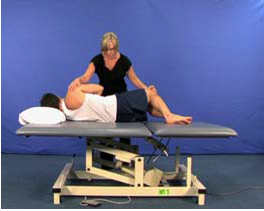AIM:
To train moving from supine to sidelying, in preparation for supine to sitting
Rationale:
Two important components of sitting up are:
1. Moving across the bed
2. Rolling onto the intact side
Task-related training is set up so the patient can practice with manual guidance from the therapist if necessary.
Equipment:
- Adjustable height plinth
- Pillow
Key Points:
1. Moving across the bed
- Patient is positioned in supine
- Patient flexes knees to 90 degrees, pushes down through both heels, lifts bottom off the plinth slightly and moves it to the side
- Therapist is positioned to the side of the patient and provides manual guidance at the affected hip, knee and/or foot if necessary
- Patient and/or therapist move shoulders to re-align trunk and pelvis
2. Rolling onto the intact side
- Patient is positioned in supine with their intact side close to the side of the bed
- Patient flexes affected hip and knee and pushes through affected heel to roll onto the intact side (patient may also flex intact hip and knee prior to rolling)
- Therapist is positioned on the intact side of the patient and provides manual guidance as necessary
- Ensure the patient moves affected arm across the chest prior to rolling (or therapist provides manual guidance as necessary)
- Ensure patient turns head
Common Errors:
- Therapist fails to position affected arm appropriately prior to rolling
- Patient is positioned too close to the side of the bed resulting in unsafe rolling
Progression and Variety:
- Decrease/remove manual guidance
- Add bed clothes
- Use regular bed

